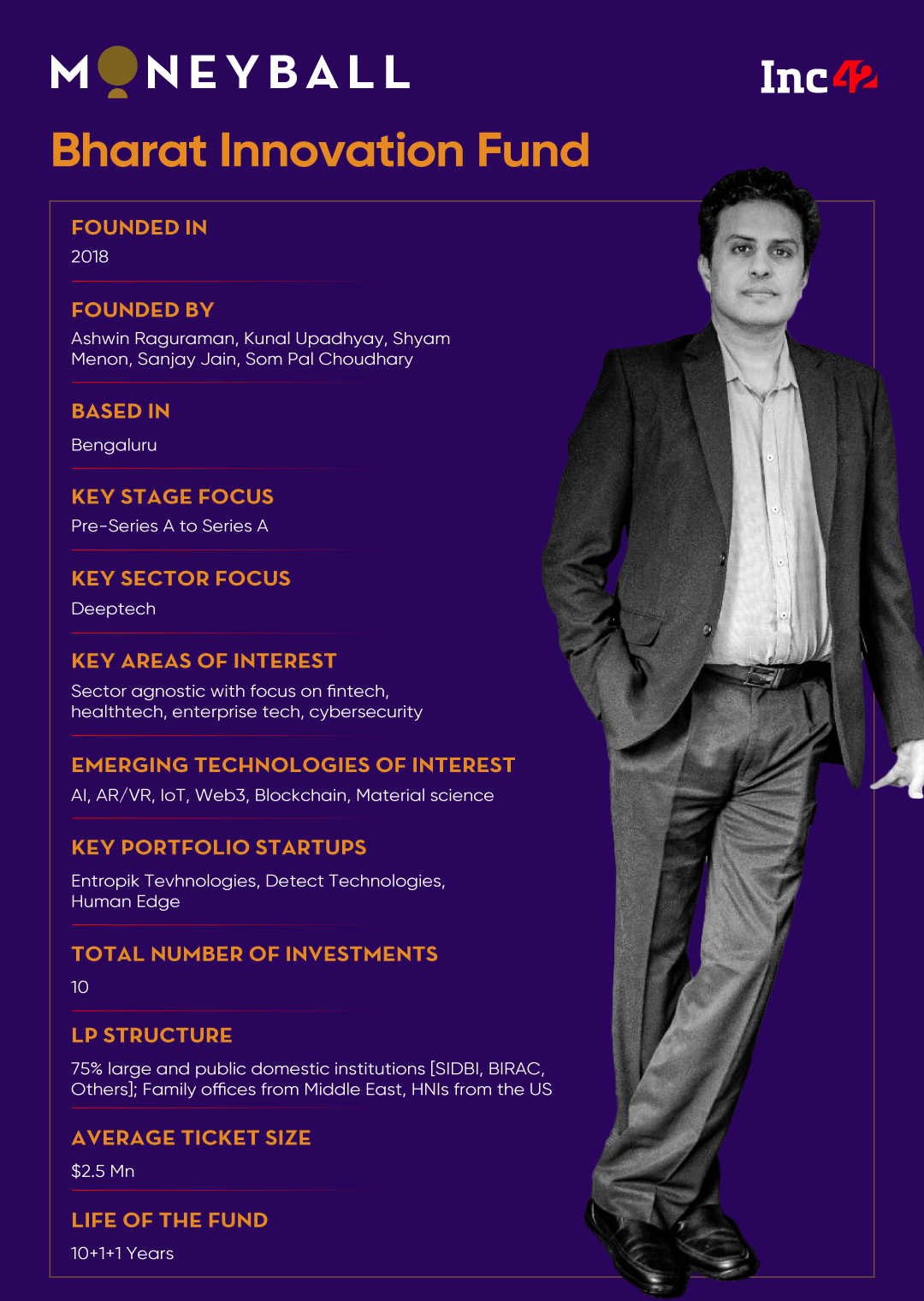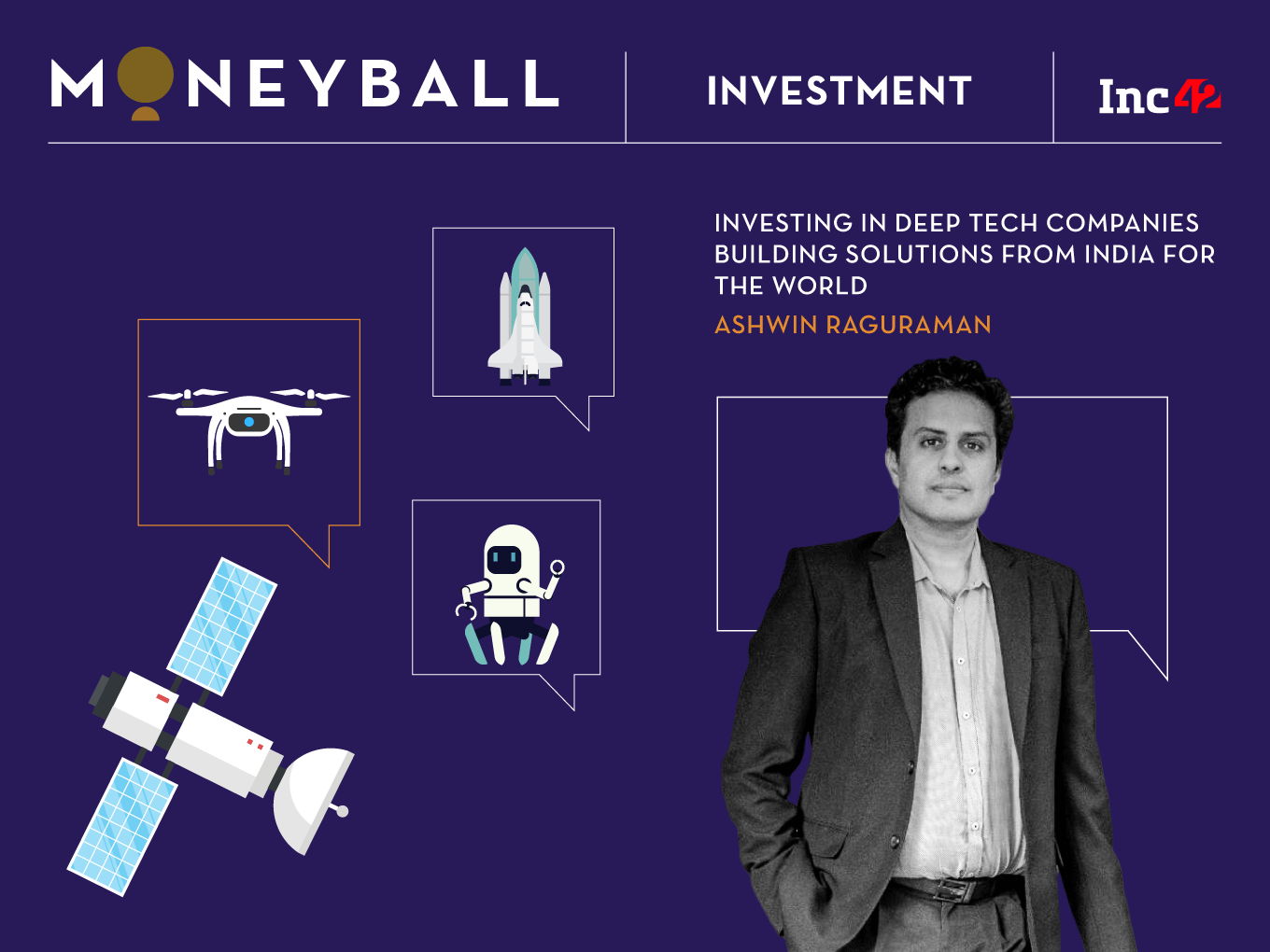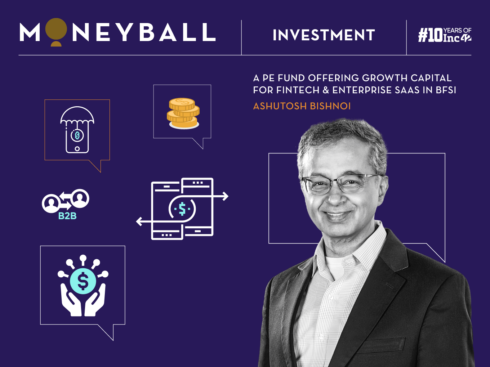SUMMARY
BIF is betting big on the country’s deeptech startup ecosystem, which is growing at a pace never seen before
According to BIF cofounder Ashwin Raguraman deeptech startups have the ability to develop innovative solutions for different sectors and combat an array of challenges that plague the world
Being high-touch investors, the fund managers believe in leading startup founders in the right direction and helping them get access to the right network, customers and resources
Despite witnessing unprecedented growth in the last few decades, India has a long way to go in solving challenges such as curbing pollution and food wastage, addressing gaps in urban planning and offering affordable healthcare to its citizens.
Even though the list is long and poses headwinds to the country’s prospects and potential, the cofounder of Bharat Innovation Fund (BIF), Ashwin Raguraman, is optimistic that Indian deeptech startups are more than capable of resolving most of these blazing issues not only for India but also for the world.
“As civilisations evolve, things are bound to become complex. The more complex the problem, the deeper the technology you need to resolve them. I’m certain that the deeptech built by talent from India is going to play a big role in solving complex global problems,” Raguraman said.
Bengaluru-based Bharat Innovation Fund was launched in 2018 as a $100 Mn deeptech-focussed thematic fund by three partners — Ashwin Raguraman, Kunal Upadhyay and Shyam Menon. They were also joined by Sanjay Jain and Som Pal Choudhary at the outset.
The fund is part of CIIE.CO’s innovation continuum and operate as an autonomous initiative. It also runs another fund, Bharat Inclusion Seed Fund, which invests in innovative tech startups at idea, seed or Pre-Series A stage.
In 2010, Raguraman set up a deeptech micro vc fund, called India Innovation Fund, the portfolio of which get sold off in 2017. The other partners had also set up a cleantech micro vc fund, called infuse ventures, which they exited successfully around the same time.
He believes that Bharat Innovation Fund is one giant leap that the founders have taken. With their initiative, the founders of the fund are betting big on the country’s deeptech startup ecosystem, which is growing at a pace never seen before.
The Rise Of India’s Deeptech Startup Ecosystem
As Raguraman reminisces, the term deeptech was not even coined when he started his first fund a decade ago. People used to identify their ventures as IP driven startups, cloud computing startups or data driven startups.
However, a lot has changed today on the back of a significant rise in the number of deeptech startups from India. Before 2014, India had less than 100 deeptech startups. Between 2014 and 2022, this number increased more than 4x to 400-plus startups.
Not only this, the ecosystem has become more structured and today embraces new sub-sectors such as defence tech, dronetech, spacetech, IoT & hardware, and robotic process automation, among others.
These startups are now utilising advance technologies such as artificial intelligence (AI), augmented reality (AR), virtual reality (VR), cloud computing, machine learning (ML), big data analytics and more to solve the complex problems of the world with innovative solutions.
A deeper thrust to the success of India’s deeptech startups was given by the booming investor trust and funding support ecosystem. Between January 2014 and June 2023, Indian deeptech startups raised $2.6 Bn in funding across 490-plus deals.
Some of the notable deals in the ecosystem include Grey Orange, which raised $110 Mn in May 2022; Smartron’s $200 Mn funding commitment from GEM in January 2022; FanCraze’s $100 Mn funding in March 2022, and 5ire raising $100 Mn in July 2022.
Bharat Innovation Fund’s Deeptech Investment Thesis
Raguraman believes that deeptech startups have the ability to develop innovative solutions for different sectors and combat an array of challenges that plague the world today.
In fact, deeptech is much more stable as a thematic play then any other consumer-facing sector. Further, compared to ventures in other segments, the sector does not demand much capital infusion to scale and offers better profitability prospects, we were told. This is because startups operating in the deeptech space burn way little cash compared to consumer-focussed ventures.
A deep understanding of this burgeoning segment allows BIF’s founders to act as a sounding boards. Being high-touch investors, the fund managers believe in leading startup founders in the right direction and helping them get access to the right network, customers and resources.
Also, they help startup founders to raise follow-on rounds from VCs like Bessemer Venture Partners, Elevation Capital, and Accel, et al.
For instance, the fund managers helped FireCompass raise $7 Mn from Cervin Family Office and Athera Venture Partners in February this year. During this time, Entropik, too, raised $25 Mn in a round led by Bessemer Venture Partners and SIG Venture Capital. Similarly, Detech Technologies raised $28 Mn in a round led by Prosus Ventures precisely a year ago.
“But then every VC can do this, right? But if I am able to bring clarity to a startup founder’s thinking on business direction or get him a $15 Mn follow-on round that he cannot do himself, I feel that’s a bigger contribution,” Raguraman said.
Here Are Some Core Areas Of BIF’s Investment Thesis:
- Business model in focus: The fund typically invests in B2B deeptech startups, which address global markets. Either these startups already have a global customer base or the potential to address global customers.
- Stage focus: The fund primarily invests in pre-Series A and Series A rounds. Raguraman emphasises that they largely invest in early stage startups because they have done that in the past.
- Investments: The fund has so far invested in 10 startups and has two term sheets in process. The founders are looking to invet in two or three more startups from the existing fund. It looks to invest in follow-on rounds as well as help its portfolio companies scale. Some of the notable startups in its portfolio include Playshifu, Entropik Tech, CreditVidya, Detect Technologies, and Human Edge, among others.

Key Differentiation Offered To LPs
According to Raguraman, there are many funds focussed on marketplaces, direct-to-consumer and SaaS startups but just a few in the deeptech space. This is the key differentiator that BIF offers to its LPs.
Having experience in the deeptech domain, it gives BIF’s fund managers the opportunity to enter, evaluate and tap quality deals. This, in turn, helps them gain the trust of their LPs as they get good returns on their investments.
“When a deeptech startup goes past the initial stage of product creation and achieves product market fit, follow-on generalist investors are willing to come in because there’s tech acting as a differentiator, thereby offering strong moats and better opportunities to scale,” he said.
Also, he believes that following the 2021 funding influx and volatilities thereafter, the LPs are now a lot more cautious. They understand that the current market is prone to fluctuations and they need fund managers who are stable, consistent and can deliver returns.
“So between a 25% return with a volatile fund manager and 20% return with a consistent fund manager, the choice is obvious,” he added.
A Lukewarm India Approach?
Notably, Bharat Innovation Fund primarily bets on deeptech startups that majorly cater to clients outside India. Further, even though Indian markets seem to have embraced maturity post-Covid, India-focussed deeptech startups is still a far-fetched priority for the fund, according to Raguraman.
This is because Indian enterprises are tough customers, and deeptech startup are marred by two key challenges in India — velocity and volume. While velocity is related to how quickly enterprises are willing to deploy a deeptech solution, volume concerns their readiness to pay for the effort and the technology.
“An INR 1 Cr customer account in India becomes $1 Mn in the US for the same effort, same product and same technology. That changes the whole equation. However, Indian enterprises are catching up and becoming more mature adopters, and we will soon have a very strong domestic enterprise market for deeptech startups,” he added.
Startup Governance: Another Pain Point For VCs
Compared to a decade ago, the Indian startup ecosystem has a lot more startups and availability of funds. The good part is that the ecosystem is now very active, vibrant and more open to taking risk. However, the negative side of this is there is a lot of noise in the ecosystem, making it harder to identify startups with right values and fundamentals.
A lot of compliance issues have emerged in the past few months, leaving many VCs with a bad taste.
According to Raguraman, around 5% of Indian startups have questionable governance practices, and as a result, 95% startups are suffering. So, governance is one of the key challenges for VCs in the Indian startup space.
“I think role models are very important in our industry and if we have good role models, a lot of high quality entrepreneurs will emerge. The entrepreneurial and tech talent in India is phenomenal and is creating huge value and it’s great to witness this evolution,” he added.
Another key challenge for VCs is the lack of strong and mature exit frameworks or pathways. “LPs these days don’t look at the total notional value of the portfolio but the returns. However, sometimes, even if my portfolio company has done well, as a fund manager, I am stuck with limited routes to exit,” Raguraman said.
Further, the key questions investors struggle with on a daily basis are related to how much to govern, how much to question a promoter without creating trust issues, how often to ask for company reports, how much to intervene in daily operations, etc.
The Road Ahead
With digitisation and technology playing a pivotal role in India’s development, the country’s deeptech startups have even bigger role to play.
According to a report by Future Market Insights, a market research firm, the global deeptech market revenue totalled $431.1 Mn in 2021 and is expected to reach $3.7 Bn by 2032.
Banking on this potential, Bharat Innovation Fund is now planning to raise its second fund soon. However, this time, Raguraman is optimistic that they will be able to add more India-focussed deeptech startups as well as domestic LPs.
Edited by Shishir Parashar



























